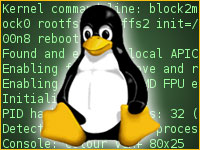
This is the year of the Linux Desktop! Oh, um, so was `expr ${THISYEAR} – 1`. No, wait. It was `expr ${THISYEAR} – 2`. Just kidding. Next year is the year of the Linux Desktop!
Of course, many continue to dream and hope, cajole, and demand that one of these years be the year of the Linux Desktop. I’m a big fan, and I’m pulling for Linux’s success, but it’s a complex formula that determines if and when.
It’s a puzzle with many pieces. I think Linux is close, but the pieces of the puzzle need to come together. Following is my take on 10 pieces of the puzzle that, if addressed, could bring the Linux Desktop closer to its year.
10. Find an anchor point. Rally around that.
People want something familiar, and if it isn’t crazy-familiar like Windows(tm) it should be familiar and universal across Linux. Yes, the 733t want extensions, and customization, but the selling point to the world is an anchor point, a standard. Ubuntu comes close.
9. Be generous. Give your time. Give your old computers. Walk the walk.
Help friends and family (and the occasional foe) by setting their Linux up and supporting them. I’ve done this, and once past the fear factor, I’ve found that unless there’s some show-stopper missing Windows application, people find Linux perfectly fine for their computing needs.
8. Convince the killer-apps owners to create real and usable ports of their products.
Not wine! Not emulations. The real deal.
I believe there is a dormant silent majority of users who, if given their treasured “have to have” applications on Linux, would more seriously consider Linux. Take away their reasons NOT to use Linux.
7. Find a sponsor willing to step up to real publicity for Linux.
Find a sponsor like Red Hat for Linux Desktop. Make it more than just a technical offering. A real and BIG sponsor like a Red Hat moves closer to the tip of the mainstream tongue. Again, as in #1, Ubuntu comes close.
6. Make Linux worth something.
I know Linux is free. I know the whole philosophy is “free.” Consumers rarely brag about their latest “free” acquisitions.
By nature, people want to know their possessions are valuable. If you want to really understand this, you need only read the first chapter of this amazing book — Influence: The Psychology of Persuasion on influencing people.
For things like OSes (say, Linux Desktop?), where owners have no way to assign worth or value to their Linux Desktop (possession), their common benchmark is how much they paid for it. This fits nicely with point #8, and point #7. It costs money to sponsor something. It costs money to market something. It costs money to port complex applications across platforms. This creates both “value” to the customer and business motive to providers.
The Linux l33t can still have theirs for free but not many find their brag interesting (no matter how great a feat that is).
5. Pay for Linux!
Continuing the theme from #6, be willing to pay for Linux. Be willing to discuss Linux as a product people buy. Be willing to say “not free” isn’t always a bad thing.
I know Linux proscribes selling Linux, but there are many success stories where Linux is the cornerstone of a profitable product (think TiVo). A nicely constructed Linux Desktop is worth money, whether FOSS thinks so or not.
4. Know the competition. Critique the competition. Avoid criticizing the competition.
Don’t say Windows sucks. It’s not constructive. It doesn’t add anything to the debate.
Microsoft can say that about Linux; they’re bigger. And if you pay attention, Microsoft is a master at crafting civil and reasoned arguments for their case, albeit with a little smoke and mirrors.
3. Be mainstream.
Don’t bore users with facts, figures, numbers (see point #4.). Stop being surprised that users just don’t care.
A short productive demo does more to show a potential user Linux’s power, usability and reliability than any list of technical details interesting only to Linux gearheads. Hint: When your audience’s eyes roll all the way back, you’re arguing the wrong facets.
2. Be easy and compatible.
A gazillion Linux distros with a gazillion application management tools is impressive. Impressive doesn’t equate to a sale.
Users don’t care if there are unlimited ways to do the same task. They want it easy, and they want it familiar. Pick a management tool — be it application installation, system administration, etc. — and make it the standard. Pick one easy to use. Try to make it universal. If Linux isn’t compatible with itself (cross-distribution), compatibility with Microsoft doesn’t matter. (Okay, maybe it does a little.)
1. Lose the attitude! Lose the edge! Stop whining already!
I love Linux and have used it for more than 10 years. Even I have tired of the strident “we’re better at …” screeds. It doesn’t matter!
The best product doesn’t always win (look up Beta vs. VHS vs. Laserdisc). The best discussion is a civil discussion. (I know, I wasn’t civil in my opening for this point. Sorry.) If you scream about Linux, the part of your conversation people remember is your screaming, not your acumen.
Carpe Annum
I’m not saying these are “the” pieces of the puzzle — nor do I claim they are even the most important. These are simply my observations of a talented, visionary, and somewhat dysfunctional community, and what I think are some focal points to address if the Linux community wants to gain real purchase in market share and mainstream acceptance.
With Microsoft floundering — if you can say that about one of the most capitalized companies in the world — now more than ever is a great window of opportunity.
Think about these points. Seize the day. Seize the year. Maybe it will be the year of the Linux Desktop! Next year.
Elbert Hannah lives in the Chicago area and does production and scheduling support for a large financial firm. He wrote the most recent edition of O’Reilly’s Learning the vi and Vim Editors. He has used Linux and worked actively in the open source community for over 10 years. In and around the house, he has more than 10 instances of Linux and as many versions and distros. He doesn’t like technical religious wars and prefers things to be sorted out by merit. He loves the Beatles and thinks the greatest album recorded is Abbey Road.



















































I have been using a Linux desktop now for 10 years. I switched from Windows as I saw the advantage of Linux for my work. I am a social/evolutionary scientist, and many of the most active scientists around the world use some version of Linux or Unix. They don’t call it a "desktop." They call it a "workstation," and it has been here, active, and effective for decades. This style of computing fits the needs of thousands of people much better than the Windows style. Linus has said that he envisioned Linux primarily as a desktop operating system. It is a grand one for certain people.
The Linux evangelists don’t see this as a success because they want to sell Linux, but Linux isn’t for sale. Selling Linux to people who really don’t want, or perhaps don’t need, a computer is the problem. The evangelists see that Microsoft has made billions doing this. Microsoft has taken advantage of human psychology. Once people have struggled to learn something they don’t want to change. It is almost impossible for any operating system (read GUI) to complete in this market.
However, what ordinary people seem to want more than anything is a communication device. A computer operating system may be a poor way of providing this, and Linux can move into an niche if it becomes a device operating system. It won’t really be a computer operating system anymore. It will be a Linux derivative and I hope the evangelists will be happy with that.
Meanwhile, there are people who need a real computer, such as engineers, scientists, professors, etc. They really do need Linux and perhaps the evangelists should start doing something for these people who really need it.
Want something else to ponder, ponder the term evangalism. Do you really want to equate it to religious dogma and intolerance?
Be an advocate, that way you can still slam the door in the faces of the evangalists when they come knocking on the door about $DIETY .
"I know Linux proscribes selling Linux…"
Well, the GPL v2 (the license under which a person or corporation is permitted to copy Linux) doesn’t proscribe selling free-as-in-speech software a’tall. Feel free to sell it for whatever you can get for it -just remember that whoever buys it can share it for free under the same license, so be sure your business model makes sense. IBM, for example, leverages Linux to increase the value of its hardware, which is much harder to share. 🙂
Thanks for the interesting and thought-provoking suggestions.
Speaking anonymously, one researcher has disclosed a possible divergence in the human genome. Evidence points to one group evolving, and using Linux, while the other group devolves while amusing itself with Windows. Is it possible? Can it be true? Ponder away, my ponderous friends!!
The value of GNU/Linux is not zero even if that is what the licence cost.
The replacement cost is billions of dollars.
It gives the same or better performance than that other OS, so it is more valuable.
100 million PCs use it because it works.
The value of GNU/Linux is greater than that other OS especially if you consider cost of operation. I need more servers if I run that other OS. I need more re-re-reboots if I run that other OS. I need to actively fight malware if I run that other OS. The value of that other OS is actually negative because it keeps costing us for as long as we use it. GNU/Linux has a one-time cost that is reasonable and then costs very little to operate.
Value of GNU/Linux = $0 – ( hundreds of dollars of negatives for that other OS) + huge flexibility + huge reliability = hundreds of dollars per installation.
When OEMs install GNU/Linux the price is hidden just as with that other OS so this is not a concern for the purchaser. 90% or more users of PCs have no clues about installing an OS of any kind.